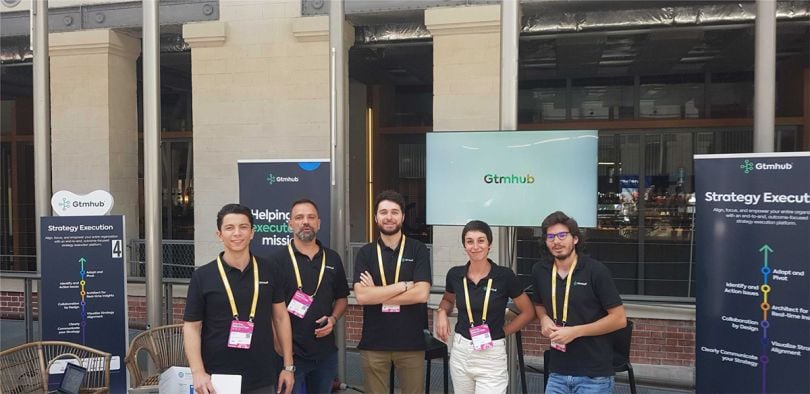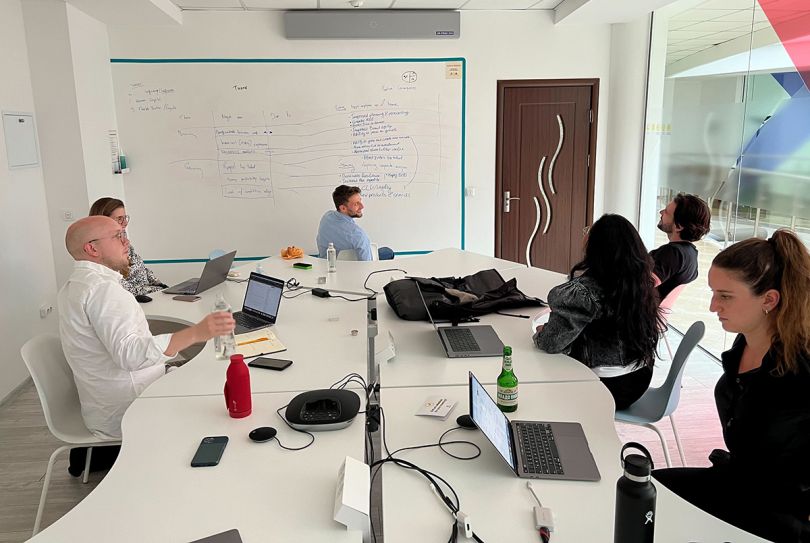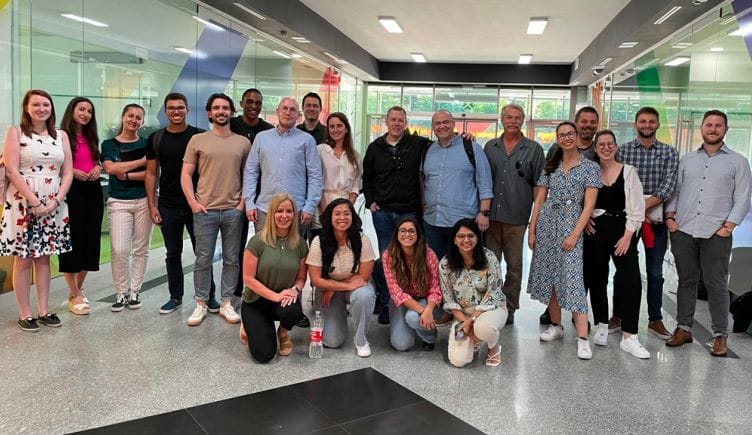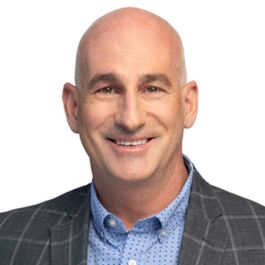“With great power comes great responsibility.”
A catchphrase more commonly associated with comic book heroics than corporate planning processes, this expression is nevertheless essential for employees at all levels of Gtmhub, the Denver-based startup behind a globally successful strategy execution platform.
Since a record-breaking $120 million Series C round last December (which the company claims is the largest-ever raise in the OKR software industry), and its more recent acquisition of Cliff.ai — a U.K.-based provider of business observability software — Gtmhub has been racing ahead with plans to double its headcount and triple its revenue in 2022. Despite the company’s rapid growth — and recognizable brands such as Adobe, Ubisoft and Red Hat among its clients — that still constitutes a lofty goal. Gtmhub rarely sets any other kind.
That’s because its software, designed to drive companywide alignment and growth, makes use of a management methodology known as “objectives and key results,” or OKRs. First introduced by Intel’s Andy Grove before being popularized at Google by venture capitalist John Doerr, this goal-setting framework sets ambitious goals then tracks progress toward them, emphasizing a company’s greater mission above its mundane business activities.
If “objectives” are larger goals a company sets, “key results” refers to how every employee can help it quantifiably reach them. At the core of Gtmhub’s approach to strategy execution is the concept that, with OKRs establishing what’s valuable to executives and managers — the mission, and individual steps for achieving it — employees at every level see how their responsibilities fit into the organization’s bigger picture, and step up to the plate accordingly.
“OKRs empower people to take control of their own destiny, rather than creating a culture where people ask you to tell them what they have to do,” said Mykaela Doane, head of people and talent at Gtmhub. “We’re getting teams involved in the process of thinking through what’s important. That offers a lot of ownership and accountability.”
With remote and hybrid work models becoming commonplace in recent years, ensuring that employees stay connected to their company’s purpose has been a high priority for tech leaders. And from her position in human resources at Gtmhub, Doane sees firsthand how OKRs have fostered employee engagement, cultivating a mission-driven culture where “people feel they’re making a real impact.”
Casey Carey, chief marketing officer at Gtmhub, first encountered OKRs during his tenure at Google. There, he also learned one of the biggest mistakes that companies can make in implementing them: conflating OKRs and their focus on companywide goals with performance reviews, which mark individual achievement.
“You want to set your objectives and key results based on what the best possible outcomes could be for your company,” he said. “Once you tie those to performance reviews, compensation and promotions, people focus on achieving the goals that are most likely.”
By shifting the focus toward collective achievement, OKRs encourage teams to aim high, take risks and own the results, even when they fall short. Were these metrics not clearly delineated from individual performance reviews, employees would fear failure and perhaps even set intentionally low goals as a result. Carey and Doane stress the importance of separating the two.
“If you’re only using OKRs for performance management, you’re missing out on huge opportunities to drive strategy execution, alignment, focus, transparency — all those other fundamentals that would make a business thrive,” Doane said.
Below, Carey and Doane discuss utilizing OKRs to align their company’s team and help Gtmhub reach consistently higher.

How do you go about introducing people to the concept of OKRs?
Chief Marketing Officer Casey Carey: People often come to the table with preconceived notions of what goal management is. They understand management by objectives (MBOs) or have been exposed to the four disciplines of execution. At some point in their career, they’ve either set goals themselves or had goals given to them, with varying degrees of success. At the end of the day, OKRs are another goal-management methodology.
The application of the methodology can vary greatly, depending on your philosophy, company and industry. It should connect strategy to work. That’s ultimately why you’re doing it. And strategy is about changing your business, not business as usual. Because of that, OKRs require you to create alignment through an organization; they’re a great tool for making sure you understand your top priorities, and that you’re aligned on those priorities.
OKRs should be outcome-based, forcing us to move away from worrying about activities and become more focused on outcomes we’re creating through them. People own their own key results. There’s an aspect of transparency to that. Everyone knows the status of a goal at any point in time, at all levels of the company. And there’s an aspect of urgency to it, that I’m going to be held accountable for what I’ve signed up for. I’m not going to wait until the end of the quarter to declare victory or defeat. I’m going to look at my goals weekly, maybe even daily, to make sure I’m making progress on them.
Head of People and Talent Mykaela Doane: OKRs align people strategically and hone a team to understand what matters. They enable people to stretch themselves and shoot for objectives they didn’t perhaps think were possible. OKRs help us to increase performance in the sense that we’re pushing people, and people are pushing themselves, to achieve great outcomes — which is what we care about when we think about how people are performing. But we’re not using OKRs to say, “This person achieved one hundred percent of their OKRs for three quarters in a row; therefore, they’re ready for a promotion.”
How does understanding that one shouldn’t conflate OKRs and performance appraisals help strengthen a workforce?
Carey: There are two philosophies around goal-setting. One is that goals are contractual obligations; “I’m going to tell you what you need to accomplish and, if you do it, you’ll be rewarded for it.” And OKRs are the other: “Here’s the big thing we need to accomplish. What do you need to do to make sure we accomplish that?” That’s where empowerment comes in, because you’re connected to the company’s biggest priorities. A sense of purpose is such an important aspect of the employee experience.
Casey, you have written and podcasted extensively about OKRs in the past, especially around the benefits they can bring and the importance of defining them correctly in an organization. Why have you continued to speak on this subject?
Carey: I’ve always been interested in goal management. I landed at Google and soon learned the power of applying OKRs but also separating them from performance conversations. In those latter conversations, you think about the work that’s been done, its quality and how the individual goes about it. Are you a culture fit? Do people love to work with you? Are you not only doing great work, but also doing it in an amazing way? If so, you’re working on both dimensions, and the question becomes, what’s the path for you? What are your gaps? How can we help you develop? You make those conversations about the person, not the outcomes.
If OKRs are about changing a business, they’re team-level or cross-functional activities. With them, you create such a vital point of alignment and unanimity of purpose across teams that you see a different level of performance from everybody. People focus on team-based outcomes, which counters the mindset of work as a zero-sum game that you’re either winning or losing. You reinforce that in performance-management conversations, but they should be more about attitude and mindset than the actual work itself.
Mykaela, how does Gtmhub’s clarity around OKRs influence the company’s management structure?
Doane: We consistently get feedback that our team is transparent; people love that in our culture. It starts with leadership then trickles down to management, but one driving principle of OKRs is that you’re driving transparency. I don’t think you could say there’s a single micromanager at Gtmhub, which comes back to our mindset of bringing on the best people that we can find then empowering them to do their job really well. We give them the tools and the space they need to succeed. OKRs provide the trust, focus, alignment and transparency a manager would need to step back and be focused on empowering, rather than directing.

Today’s HR professionals are often overburdened, tasked with handling employee engagement, performance and compensation. Do OKRs relieve pressure on Gtmhub’s HR department?
Doane: We brought on an HR team later than other companies might have. I joined when we were at 120 team members, after our Series B funding. OKRs had provided a strong foundation that allowed us to not have some of the typical processes and systems that other companies might have implemented sooner. Even without a formal performance-review process for a long time, employees felt they were getting the feedback they needed, and managers had a sense of how everyone was performing or needed to develop, because that’s part of the OKR process. It did create a booster for HR’s efficacy without taking much bandwidth from my team.
Carey: Often, when you tie goals and performance management together, it’s discussed as “an HR thing.” That’s when you get goals that are easy to achieve, that you don’t look at until the end of the quarter. With OKRs in place, that becomes how you do business. It’s no longer HR, which removes some of that burden, so that HR can focus on other aspects of employee experience that are also important.
Gtmhub uses its own product internally. How has the transparency it offers been relevant at work recently?
Doane: It’s harder to have surprises and harder to hide. Anyone at Gtmhub can see almost any metric or result at any given time on our platform. If you’re paying attention and want to know, you will know. When decisions come down, there’s not usually a huge amount of shock and awe. It’s like, “Oh, yeah, I knew that. I’ve been watching that.” You can put together the pieces.
Carey: In mid-June, we recast our corporate-level OKRs, with the backdrop of a changing economic environment. Our willingness and ability to do that is important, because it means we’re in touch with reality, but are altering goals in a transparent way and communicating those changes to the rest of the org. Everyone else needs to reassess their own priorities, to make sure we get to where we’re going. It’s that agile notion, which compresses time around decision-making. At the end of the day, if you’re managing fast, you’re running the business fast.



